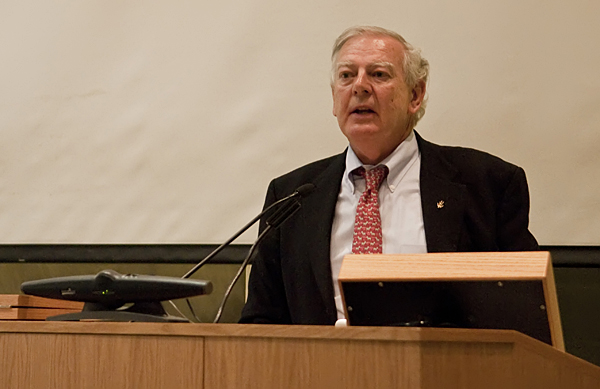
Out of Africa
Anthropologist who discovered 'Lucy' discusses human origins
9:06 a.m., April 22, 2011--No matter what people look like or where their families have lived for generations, acclaimed fossil hunter Donald C. Johanson says, the qualities that make them human can be traced to a single location.
"Each and every one of us in this room, regardless of the color of our skin, is an African," Johanson told a standing-room-only crowd at the University of Delaware on Wednesday, April 20, for the annual Dr. Arnold M. Clark Memorial Lecture. "Whenever we grasp a branch of the human tree, its roots go back to Africa."
People Stories
'Resilience Engineering'
Reviresco June run
Johanson, a professor and founding director of the Institute of Human Origins at Arizona State University, is best known for his groundbreaking 1974 discovery in Ethiopia of a 3.2 million-year-old skeleton that is viewed as a transitional fossil between ape and human. Dubbed "Lucy" after a Beatles song Johanson had recently heard, the fossil led to major revisions in scientific thought about human ancestry.
In his lecture at UD, Johanson noted that Lucy has become "an icon of paleoanthropology" and a benchmark against which later discoveries have been compared as scientists seek to understand where various fossils fit into the evolutionary process. Evidence shows, for example, that Lucy was an adult female, about 3-and-a-half feet tall and 60-65 pounds, with short legs and long arms. She had a softball-size brain, comparable to modern apes, but stood and walked upright as humans do.
Johanson described the day he happened to notice a tiny bone on the ground in the Ethiopian portion of East Africa's Rift Valley--where the geology has left a treasure trove of fossils and, he said, "has opened a window to the past." He recognized the bone as a human elbow, and he and his team eventually uncovered Lucy's fairly complete skeleton in that location.
"This was a major breakthrough at the time," he said, because previous discoveries from the same time period consisted only of small fragments. But Lucy was just the start, Johanson said, describing how paleoanthropologists have since found more than 500 fragments of her same species from various sites in Africa.
He noted that other information has also come to light, the result of scientific research that has mapped the human genome. Based on that genetic information, it's clear that humans originated in southern Africa and moved from there into other parts of the world, he said, describing an evolutionary "tree" in which species developed, adapted and, often, died out.
"We are all united by the past," Johanson said, calling for humanity to take responsibility for protecting the natural world for future generations. "Today, we are globally a common species. We are the ones that survived."
About the Dr. Arnold M. Clark Memorial Lecture
UD alumnus Dr. Howard Hudson, a 1963 graduate in biological sciences who now is an anesthesiologist in Allentown, Pa., established the annual lecture as a tribute to the late Prof. Arnold M. Clark.
Dr. Clark, a member of the Department of Biological Sciences faculty from 1946-1981, was an adviser and mentor to Hudson during his undergraduate studies.
Hudson and his wife, Patricia Hudson, a 1963 UD graduate in elementary education, have attended each of the Clark lectures since the series began in 2007.
Article by Ann Manser
Photo by Doug Baker








